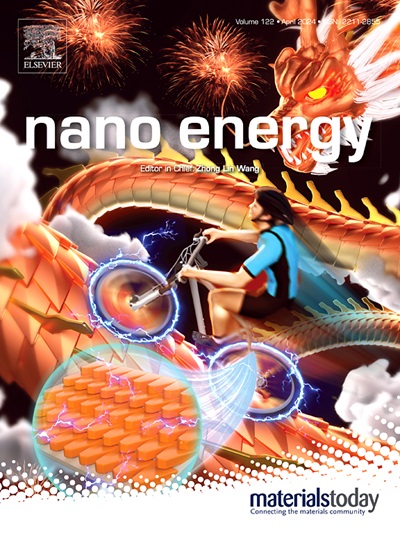构建p-π共轭、相纯的dj型二维钙钛矿修饰层,将高效钙钛矿太阳能电池的运行稳定性提高到15,160小时
IF 17.1
1区 材料科学
Q1 CHEMISTRY, PHYSICAL
引用次数: 0
摘要
具有2D/3D异质结构的钙钛矿太阳能电池(PSCs)由于碳原子长链的插入而导致电荷传输能力受到抑制,从而影响了PSCs的功率转换效率(PCE)。本文采用一种新型的j型二维钙钛矿,利用1,1-二甲基双胍盐酸盐(DMe-bi-GuaCl),通过脂肪族二胺阳离子在三维钙钛矿表面自发形成垂直取向的相纯二维钙钛矿修饰层(n=1)。关键的是,这项工作引入了一种以交替p-π键为特征的有机共轭结构,该结构与相邻的无机八面体中间层的电子云和其多氨基重叠。连续垂直电荷输运通道显著增强载流子输运,载流子输运从0.208 cm2·V-1·s-1提高到2.13 cm2·V-1。该修饰层不仅钝化了三维钙钛矿多晶结构晶界处的缺陷位点,而且通过其末端二甲基建立了疏水屏障,有效地抑制了卤化物离子的迁移。优化后的钙钛矿膜在冠军PSC器件中的PCE提高了23.81%。重要的是,在15160小时的环境条件下,未封装的psc保持了89%的初始效率,在50±10%的相对湿度下保持了4200小时的湿度稳定性。本文章由计算机程序翻译,如有差异,请以英文原文为准。

Constructing a p-π conjugated, phase-pure DJ-type 2D perovskite modification layer to advance the operation stability to 15,160 hours for efficient perovskite solar cells
Perovskite solar cells (PSCs) with 2D/3D heterostructures often experience inhibited charge transport capabilities due to the intercalation of long chains of carbon atoms, consequently affecting power conversion efficiency (PCE) of PSCs. Herein, a novel DJ-type 2D perovskite by using 1,1-dimethylbiguanide hydrochloride (DMe-bi-GuaCl), spontaneously forming a vertically oriented phase-pure 2D perovskite modification layer (n = 1) via aliphatic diamine cations on 3D perovskites surface. Critically, this work introduces an organic conjugated structure characterized by alternating p-π bonds, that overlaps with the electron clouds of adjacent inorganic octahedral interlayers with its multi-amino groups. It results in continuous vertical charge transport channels that significantly enhance carrier transport, advancing from 0.208 to 2.13 cm2·V−1·s−1. This modification layer not only passivates defect sites at the grain boundaries of the 3D perovskite polycrystalline structure but also establishes a hydrophobic barrier through its terminal dimethyl groups and effectively inhibiting halide ion migration. The optimized perovskite films exhibited a notable improved PCE of 23.81 % in champion PSC devices. Importantly, the unencapsulated PSCs retained 89 % of their initial efficiency after 15,160 hours in ambient conditions along with improved humidity stability under 50 ± 10 % relative humidity over 4200 hours.
求助全文
通过发布文献求助,成功后即可免费获取论文全文。
去求助
来源期刊

Nano Energy
CHEMISTRY, PHYSICAL-NANOSCIENCE & NANOTECHNOLOGY
CiteScore
30.30
自引率
7.40%
发文量
1207
审稿时长
23 days
期刊介绍:
Nano Energy is a multidisciplinary, rapid-publication forum of original peer-reviewed contributions on the science and engineering of nanomaterials and nanodevices used in all forms of energy harvesting, conversion, storage, utilization and policy. Through its mixture of articles, reviews, communications, research news, and information on key developments, Nano Energy provides a comprehensive coverage of this exciting and dynamic field which joins nanoscience and nanotechnology with energy science. The journal is relevant to all those who are interested in nanomaterials solutions to the energy problem.
Nano Energy publishes original experimental and theoretical research on all aspects of energy-related research which utilizes nanomaterials and nanotechnology. Manuscripts of four types are considered: review articles which inform readers of the latest research and advances in energy science; rapid communications which feature exciting research breakthroughs in the field; full-length articles which report comprehensive research developments; and news and opinions which comment on topical issues or express views on the developments in related fields.
 求助内容:
求助内容: 应助结果提醒方式:
应助结果提醒方式:


